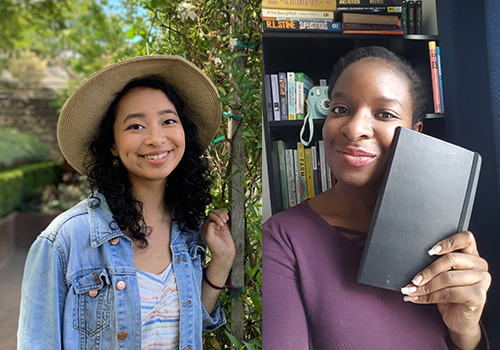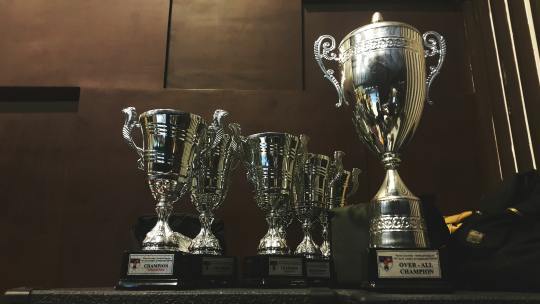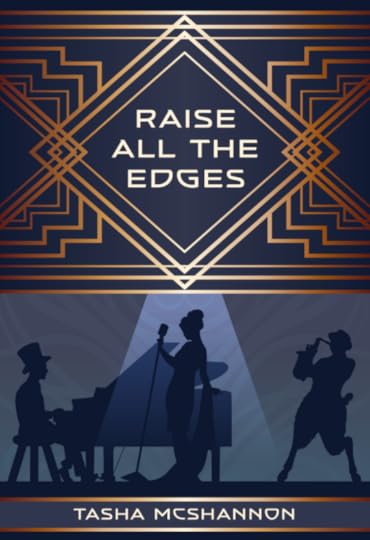Chris Baty's Blog, page 43
December 18, 2020
So You Tried NaNoWriMo, What’s Next?

Now that NaNoWriMo 2020 has ended, the NaNoWriMo staff will be taking a little winter hibernation, so this blog will be on hiatus until January 2021. Here are a few ways YWP Participant Sanna G. suggests keeping your writing ideas flowing even if you need a bit of a break, too:
Congratulations Wrimo! Maybe you wrote 100 words or even 50,000 last month. Whether you reached your goal or not, fantastic job! At this point, you have done some hardcore writing. Maybe your fingers are stained with ink, your hands hurt from all of that typing, you have indentations on your fingers where your favorite pen has sat, or your eyes hurt from staring at your screen for so long. This is where I was. I needed to take a break.
Now is a great time to recharge your ideas. After three years of being a NaNoWriMo participant, I have found that the best way to keep my writing flowing is to look at moments in my life, or by reading books. I keep these sparks of inspiration in my journal that I look at later when I want a story idea.
For example, during COVID-19, my teachers changed classrooms while the students stayed put. One of my teachers came in and almost tripped over the trash can that was nearby the classroom door. Later, I then added a plot twist to one of my stories about a trash can that was purposely tripping people.
Finishing my basement with my family provided another spark of inspiration. It takes a long time and a lot of dusty, hard work to finish a basement in real life. In my imagination, overnight the main character’s basement gets finished while he and his family are sleeping and none of the family members can figure out who did it. The main character tries to figure out who came into his house and why.
Books also provide an excellent source of ideas. In one of my favorite books, Tuesdays in the Castle by Jessica Day George, Princess Celie loves to map the castle that she lives in. As I was re-reading this book, I thought about a map that always changes depending on where you are. Everyone can see this when they look at the map, but only the main character can see what will happen if she walks certain routes. She now sees that no matter the way she walks, she will get kidnapped.
In another favorite book of mine, Spin the Dawn by Elizabeth Lim, a girl named Maia has to sew three impossible dresses out of the laughter of the sun, the tears of the moon, and the blood of the stars. This inspired me to come up with a legend about three hidden boxes: one with sunlight, one with starlight, and one with moonlight. It is said that when you mix these together, you will get one wish that will come true. The main character’s world is falling apart, and their last hope is to find these boxes.
So, how do I come up with these ideas? First, I think about what happens to me in my life. Was anything really funny or had some sort of important meaning that struck out to me? Let your imagination run wild once you have a moment in mind and add it to your story or maybe start a new one!
Maybe you would prefer to go the book route. Pick up your favorite book or the one next to you and read. What came out at you? Alter this a bit and there you have it! The perfect thing to add to your story or a new one.
Do you still want some more ideas to help get that lightning strike of inspiration? I suggest reading Write is Book by Pseudonymous Bosch or Writing Radar by Jack Gantos.
Happy writing!

Sanna G. is a thirteen-year-old third year participant of NaNoWriMo. She hopes that someday soon she will be able to get at least one of her books published. Sanna can be found reading, writing, or spending time with those close to her. Books that she generally likes to write and read are young adult, adventure, realistic fiction, fantasy, and sometimes romance, but she will read any story if it has good characters and a nice plot.
Top photo by Joe Ciciarelli on Unsplash.
December 17, 2020
Catch You On the Flip Side: Farewell from 2020 Interns Sandra and Chyina

We’re always sad to see our interns go—and they’re often sad to leave us! We’re wishing our talented interns farewell for now as they leave these roles, but we’re comforted by the fact that they’ll still be around as participants and forever members of the NaNoWriMo family. Here’s some reflection from fantastic Fall 2020 Interns Sandra and Chyina:
It’s December! NaNoWriMo 2020 has been over for a little over two weeks, and somehow, it feels like both yesterday and an eternity ago. In an official capacity, I haven’t been with NaNoWriMo for very long, but as my time with the organization draws to a close, I inevitably find myself thinking about the beginning. Not three months ago, when I got the news that I would be working for them—but ten years ago, when my sister looked over at me, frantically scribbling away on my latest masterpiece, and asked, “Have you heard of NaNoWriMo?”
I don’t think either of us realized how important NaNoWriMo would become to my writerly experience. Over the years, the people behind NaNoWriMo carried a certain mythos in my head. They were a sort of shadowy league of novelists, empowering others to write 50k every November. I remember reading as a wee middle-schooler about how the first NaNoWriMo staff got carpal tunnel from signing people up, and, as such, were unable to participate in NaNoWriMo.
“That’s hardcore,” I said, and resolved to give myself carpal tunnel. (No, I have not yet succeeded, and have realized since that it’s a terrible goal.)
And the people on the staff ten years later prove to be every bit as hardcore as I imagined. But not in the damage-your-wrists kind of way (so far), but in the resilient way, the one that keeps an organization running when it seems like every obstacle is in its way. I can’t think of a better staff to have experienced the election with, to have worked with during COVID, to run around trying to murder each other in viral sensation Among Us. Yes, they are not perfect. But every time they made a mistake, they used it to move forward, to ask themselves, How can we be better as an organization?
How can we be better as an organization? How can we be better as staff, as writers, as people? Ten years of NaNoWriMo means that I’ve convinced quite a few people to try it and I always tell them it’s critical to be passionate about their NaNoWriMo novel. Working behind the scenes, however, has shown me how important it is that passion comes from both ends. The reason NaNoWriMo feels special, the reason I keep coming back to it, is because of how much its staff cares about the organization. So long as that stays the same, I can’t see NaNoWriMo going anywhere but up.
I didn’t win NaNoWriMo this year, but that’s okay! I’ll be back next year, back on the regular Wrimo side. I’ll see you all there.
Sandra first learned of NaNoWriMo in 2010 and has completed many first drafts since. (She does not speak of the earlier ones.) When she’s not writing, she reads a lot of LGBT science fiction, watches animated shows/movies, and thinks about food. All the time. She loves food, so, so much.
Chyina Powell, Editorial InternWhen I was asked to write a farewell post to end my internship with National Novel Writing Month, the first thing I thought was, “I don’t want to.” And I thought this for two reasons:
That being said, I decided to just jot down some of the things that came to mind, like how I came to work with NaNoWriMo this fall and the cool things I was able to experience because of it.
2020 has been a very weird year for everyone, but in the mess and mayhem, there have also been opportunities. This was the first time EVER that NaNoWriMo decided to hire remote interns and that meant that I could apply to work with an organization I had been a part of for years! And oddly enough, I was chosen to become the Editorial Intern. Perhaps it was due to my love of showtunes or overall weirdness, but whatever the case may be, I was able to work with some really amazing people. Not only the other staff and interns, but with the participants and guests as well.
It was truly amazing to see just how creative and imaginative each and every NaNo and YWP participant was throughout the fall. Reading some of the forum posts, soliciting blog posts reminded me of just how important community is to writers. Participants bouncing ideas off of each other, congratulating each other for meeting word count goals and being chosen for 30 Covers, 30 Days, encouraging each other when things don’t work out the way they planned.
I was also privileged to see what happens behind the scenes, how one small team can make November memorable for people all over the world. Everyone who has a hand in making NaNoWriMo what it is, from the staff to the interns to the MLs and forum moderators are spectacular people. They made this internship experience feel comfortable and welcoming. And even though I am on the other side of the country from the other staffers, I didn’t feel like I was left out of anything. In fact, the staff (at least in my opinion) made sure that we interns felt like we were a part of the team, asking our opinion and giving us the opportunity to work on really cool projects.
So, I would like to thank everyone from the participants to the staff to everyone who partnered with NaNoWriMo this year, during a global pandemic, for making this one of the best internships I have ever had and reminding me just how fun writing can be when you have people there supporting you every step of the way.
And for those of you who never would’ve imagined that an opportunity could have risen out of such a dismal year, I urge you to see the bright side of things. Before this pandemic, I never could have imagined working with NaNoWriMo (I had no inclination whatsoever to move to California) but look at me now! Remember that no matter what, you can turn a bad situation into something positive, something magnificent. And maybe it’ll be you I watch next fall in a Virtual Write-In!
This was a great opportunity and I loved every minute of it. And with that, I say farewell (although I would prefer not to!)
Chyina Powell is an editor and writer who loves speculative fiction and suspense. She is a published writer who has participated in NaNoWriMo for seven years! Additionally, she is the Co-Founder of the Women of Color Writers’ Circle and an active member of Sigma Tau Delta, the English Honors Society. Follow her on Instagram or add her as a NaNo buddy! She is always looking for more bookish friends!
December 16, 2020
Opposition Research: Where to Get the Best Info for Your Novel

Now that you’ve written the first draft of your novel, you may find that you need to do some extra research to fill in those plot holes and polish up your story. Today, author Jodi Compton is here to shine some light on researching elements of your story between drafts:
I’m a crime and mystery novelist. It’s a genre which requires a good deal of research—a daunting task many Wrimos will be tackling for the first time in December and beyond. Many of us research between drafts, writing the first version straight through as a ‘proof of concept’ rough draft. Writing “[research tk]” at strategic points in a first draft can be an essential part of getting to 50K.
For that reason, I want to share a secret I’ve learned about good research. At first, I’ll be using crime fiction as my example, but the lesson is applicable to all genres, which I’ll address. (Hang tight, you hordes of fantasy writers!)
When I first began writing crime fiction, I did what most mystery novelists do. I read books on investigative work and forensics. I watched documentaries on the same subjects, including Dateline and Forensic Files and Women and the Badge. Later, when I had very specific questions, I found sources in the law-enforcement world and asked directly.
The upshot of all the books, documentaries, magazine articles and interviews tended to be this: There’s always forensic evidence. It’s always correctly gathered. The DNA test is always right. The polygraph is always reliable. And everybody involved—the police and prosecutors—almost always do the right thing.
This past year has—to put it mildly—called those assumptions into question. But that’s the subject of another article. However, long before this troubling year, I’d noticed something interesting. Crime-fiction writers like myself are always trying to write a story about the exceptions—the locked-room story, the extremely clever criminal who almost gets away with a murder or a heist, or a story in which the most unlikely person imaginable is actually the killer.
So why are we always looking at sources in which the most likely suspect is, in fact, the murderer, in which standard operating procedure gets the investigative job done, there’s always DNA at the scene, and the polygraph tells you exactly who did it?
Because, mystery writers might argue, there’s no source for stories about cases where things went sideways. Nobody writes about those, and no source on the inside wants to talk about them.
That seems true, at first. Ask me how I know: My first novel, The 37th Hour, deals with an FBI agent-in-training who does a Very Bad Thing just before his term at Quantico starts. To flesh this out, I spoke to a public information officer at the FBI—who dismissed my concept out of hand. That really wouldn’t happen, she told me. Our psychological screening would catch someone like that.
It didn’t seem very productive to say, Like your psych screening caught Robert Hanssen? So I didn’t. (Plus, I didn’t think of it until hours later).
It was only later in my writing career that I learned that there are people who talk and write about how the criminal-investigation process runs off the rails: They’re called defense attorneys. Behind them, and fighting a larger battle, are the ACLU and the Innocence Project—lawyers, law students and investigators who uncover false convictions. These convictions can be those due to mishandled DNA, inconclusive polygraph results interpreted as guilt, false confessions made by exhausted, hungry and confused people in interrogation rooms, or naive, easily-swayed juries.
You have to get off the beaten path to find these stories, told in smaller-circulation magazines or blogs or documentaries. The “Dateline Saturday Night Mystery” has been immensely popular for years. No network is going to air the “ACLU Saturday Night Miscarriage of Justice” any time soon. But the latter, I think, would be as fascinating as the former. And, for the novelist looking for ways to complicate a straightforward crime, very profitable.
Okay, you say. That’s fine for crime writers, but the most popular genre in National Novel Writing Month is fantasy. How do we fit into this situation?
I hear you. Fantasy is to NaNoWriMo what Thin Mints are to Girl Scout Cookies. So let’s say you’re writing a story in which characters have supernatural powers. This is where—though science is considered the opposite of magic—an understanding of physics, biology, chemistry and more could add great verisimilitude to your novel.
A study of magicians and their tricks can be useful as well. Many magicians are diehard skeptics about the paranormal—James Randi, of course, being the most famous example. But they also know a lot about physics: For example, the manipulation of light and how it affects what people see, or think they see. Might your genuinely-magical character manipulate light to create glamours or illusions?
‘Opposition research’ will be of varying use to writers in varying genres, but I’d argue that there’s almost always something to be gained in doing it. Conflict is the engine of virtually every story. Whenever you look at ‘maps’ or ‘graphs’ of a novel’s plot, you’ll see points labeled ‘conflict 1’ or ‘first setback.’ Understanding what opponents or devil’s advocates have to say about your protagonist’s quest will be of great help in creating conflict or setbacks in that journey.
Jodi Compton is the author of four crime novels, starting with The 37th Hour, about Minneapolis detective Sarah Pribek. Her fifth book, Redball, will be released by Amazon early in 2021. She is an eight-time National Novel Writing Month participant.
December 14, 2020
Your NaNoWriMo Check List: Novel Complete—Now What?

Now that NaNoWriMo is over, what is there to do? Here’s what NaNo Participant Jeff Bray suggests:
First of all, Congratulations, Wrimos! For some of you, the thirty days of November have been the most grueling adventure you have ever been on. For others, perhaps those with one or more NaNos under your belt, the thrill of crossing the finish line once again is burning in your heart. Either way, your senses are on edge, and you have never felt so exhilarated in your life. Burnt out or on an “another-notch-on-the-bedpost” high, you are finally glad to cross the finish line of NaNoWriMo2020.
A Year to RememberThis year has been a year for the books. Maybe your story reflects some of the adventures this year held for each of us. Perhaps you used your writing as the escape, and it pulled your readers as far from reality as possible. Either way, good for you! You now have a piece of yourself in writing that will be remembered for ages. But now that the adrenaline is winding down and the smoke is clearing from your keyboard, what’s next? You have grown so accustomed to your daily dose of clickety-clack and late night cappuccinos. (Okay, maybe you went a bit heavier at times. Especially in that last week.)
Your Biggest TemptationThe biggest temptation is to dive right back into your piece and begin the editing process, right? I mean, you can’t get your book on the shelves for your readers to purchase if you don’t begin the editing process today. Am I wrong?
The truth of the matter is that NaNoWriMo experts all agree that stepping away from your project for at least thirty days is best before you begin the editing process. There are many reasons for putting your masterpiece on the back burner, one of them is the opportunity for the smoke to clear the room from the speed at which you wrote it. The other, and primary reason, is to allow your objectivity to settle in. That can only be accomplished when you step away from your project for a short period of time. It is similar to the fresh eyes/fresh perspective principle. Only time gives you the freshness you need.
Go Celebrate!!So, what can you do during the long, painstaking event-filled month of December? Well, for one, go celebrate!! You deserve it. You just crossed a milestone many only dream of—you wrote a novel! Congratulations!! Second, enjoy the holidays with your family and friends. That will do a good enough job of occupying your time. However, don’t let temptation whisper in your ear or trick you into opening up a page to edit. Remember, objectivity only comes with time. You will thank yourself come January 1, 2021. With waiting, your eyes will be fresh, and you will see errors and changes you would’ve missed if you had opened that file on December 1 to edit. Until then, enjoy your success wholeheartedly with the excitement of what next year holds for you, while your beloved masterpiece simmers on that back burner.

Jeff S. Bray is a full-time Freelance Writer, Editor, and Published Novelist. He lives in South Texas with his wife, Carolyn, and two of their children. He is a three-time NaNoWriMo participant. Both of his completed NaNo projects, The Five Barred Gate and Little Reminders of Who I Am, have gone on to publication. He also writes children’s stories with a published series titled Elissa, the Curious Snail.
Photo Courtesy of Glenn Carstens-Peters via Unpslash.
December 11, 2020
What Makes Writing Worthwhile

One of the wonderful things about NaNoWriMo is that it brings people together who all share a common love: writing. Today, NaNo Participant Rachel Meyer shares a few of the many things to love about being a writer:
2020 has been a hard year for everyone. For me, that hardship has applied to NaNoWriMo as well. It makes me sad because I love NaNoWriMo, and I’ve never had this kind of struggle to simply sit down and write every day.
But through it all, I’ve kept trudging forward. Sitting down and writing every day, even though each word is a struggle. Trying to find the right music to get me in my writing head-space. Writing until nine o'clock at night (late for me) just to finish my word-count.
You want to know why?
Because I love writing. I love the story I’m working on. Even when it’s hard, I push through because I wouldn’t have it any other way.
I hope you feel the same way about the story you’re telling. If you need a reminder, here are five reasons that writing is worthwhile for me, even when it feels like trying to walk up a down escalator.
1. I love that writing enables me to create.I’m making new worlds, characters, and stories that no one has seen before. You’re the only one who can tell the story that’s inside your head. Never forget how amazing that is.
2. I love bringing hope through the words I write.That’s one of the most powerful things about stories. They can bring light in the darkest places. We always need hope in our day to day lives, and this year more than ever.
3. It’s a great way to escape.When the world seems awful, I can sit down at my computer and write myself a new one. It can be even better than reading or watching a movie, because in your story, you’re in charge.
4. I love a challenge.That’s why I started doing NaNoWriMo in the first place. I’ve won it five times in a row. I really don’t want to break that streak now. I am determined to win my sixth time, come hell or high water.
5. My writing is worthwhile to me because it’s my passion.It’s what I was meant to do. It’s the thing I want to spend the rest of my life doing. Going through something like this is hard, but it will give me so much more to write about.
I hope that you can relate to at least one of these reasons for writing and that this post reminded you of them. You can do it! So go forth and write.

Rachel Meyer is a writer, book addict, and geek. She’s been writing since she learned how and hasn’t stopped since. She loves to read big books and spend time with her cat, named Cheshire. You can find her on her blog (which covers everything from writing to movies) and on Instagram (which contains pictures of books).
Photo Courtesy of My Life Through A Lens via Unsplash.
December 9, 2020
Unleash Your Inner Wrimo! A Young Writer’s Tips for Getting Over Writer’s Block

NaNoWriMo may be over, but sadly, writer’s block is a year-round headache. Want to know what YWP Participant Jonia C. has to say about it?
We are through November, writers! You’ve made it so far and might I say that it is very impressive. Before continuing, throw a party for yourself!!
December 7, 2020
Building Up Your Writing Habit

NaNoWriMo may be over, but that doesn’t mean you should stop writing. Here are some tips that NaNoWriMo Participant Alexis Collazo uses to keep up her daily writing goal:
The most common advice writers give is to stick to a regular writing routine, whether you feel like it or not. Like most advice, this is easier said than done. Maybe you can’t set up a regular routine, or maybe you had one and life threw a wrench at it. Sometimes no matter how badly you want to write, you still just don’t feel like it. Here are a few tips that have helped me.
I’ve found it easier to commit to writing everyday if I make it the first thing I do. After reading Julia Cameron’s The Artist’s Way, I started doing morning pages. I didn’t like them and if I didn’t start as soon as I got up, I wouldn’t do them. I was never sure how useful they really were to me but it was an easy habit to keep up. Plans to write any other time of day usually fell victim to one excuse or another. I didn’t always stick to three pages, I’d change it to suit my needs. It was more important for me to have a morning routine I could build a daily writing practice into. I was down to a page earlier this year when I swapped them out for short journal prompts and more creative projects.
2. Lower your standards.It’s easy to not write when you hold yourself to high standards. Whether it’s a time requirement or a high word count goal, it turns into an excuse when you don’t feel like writing. It’s also discouraging when you’re not confident in what you’re writing. I felt like I was wasting my time if the writing wasn’t good enough to be published.
I had to set the bar lower. I stopped setting time based goals and started building a routine with short writing exercises I didn’t plan on sharing. One very useful tool was the book Embrace Your Weird by Felicia Day. The short creative exercises only took a couple of minutes and helped me enjoy writing without judging the work. I slowly started adding small daily goals. In July I participated in Camp NaNoWriMo with a goal of 10,000 words, about 300 a day. I hit my goal in less than twenty minutes most days. Seeing the words add up helped shift my attitude. Even days I fell short, I was able to think it was still better than nothing.
3. Make commitments.Just telling myself to sit down and write barely works when I feel like writing. Committing to an event where I have to write will get me writing no matter how I feel. It doesn’t even have to be a big commitment. In April I attended most if not all the NaNoWriMo virtual write-ins. Just the idea that I’d set the reminder to attend was enough. I didn’t get a lot of writing done, but every word counts.
For a while, I let the lack of a writing community in my area be an excuse. Once I decided to push myself I started a virtual writing group, recruiting people from Facebook writing groups then meeting via Skype. Each month we sent each other work to critique so I had to produce. I didn’t have something every month but I was writing and editing more work than before. Now more than ever my location is no excuse. The pandemic has highlighted online options and forced others to move their events, workshops, and classes online. I’ve been attending virtual writing workshops with the New York Writers Coalition and just finished a class offered by the Writer’s Center. So there are options out there for you as well!

Born and raised in Brooklyn, New York, Alexis M. Collazo now lives in Pennsylvania. She’s an avid reader, writer and multimedia creator. Her versatile skill set has led to a varied career, as a writer and otherwise, including years in retail and office work, a short copywriting career, freelance writing and a lot of random gigs. She is currently focused on producing more creative work, including horror stories, poetry, and expanding into other art forms. You can find her crafty creations for sale on Etsy and follow her on Twitter @lexc666.
Photo Courtesy of Drew Beamer via Unsplash.
December 4, 2020
3 Easy Steps to De-Stress After NaNoWriMo

NaNoWriMo goes by quickly and can be extremely hectic. Here are some ways that NaNo Participant Arlo Quilldrake has to help you relax after November ends!
First, I would like to say congratulations. No matter how much you’ve done this NaNo season (if you’ve participated, if you’ve written words on a page, or even if you were merely cheering on your fellow writers) you deserve praise. You’ve conquered the mountain that is NaNoWriMo, an arduous task for everyone, and you’ve come out the other side a little bit better for it.
You are also probably incredibly stressed as well. You’ve either completed your 50K word goal and you’ve sacrificed sleep and social interaction to do it, or you’ve just fallen short of your goal and you’re stressed. Perhaps, you’ve even fallen off the wagon completely and approaching the task once more seems overwhelming.
Stress seems to be the theme of this year and I do not believe that I’m putting it mildly or exaggerating when I say regardless of why you are stressed, you need a breather.
So, I am here today to give you a few tips on how you can help ease your post-NaNo stress.
Step One: Breathe.To begin, the first thing I advise—and probably the most important thing—deep breaths. I’m not joking. It seems like such a small and obvious thing, but sometimes the simple reminder of how well they work cannot be underestimated. I want everyone to do this; take a deep breath even as you read this. No specific time, no specific form—simply breathe. Quieting the little voice in your head named ‘anxiety’ starts with calming your breathing.
Feel better? Good.
Step Two: Hydrate.Next, take a drink. Avoid anything with too much caffeine or sugar in it (unless that is exactly what helps you calm down) and avoid anything alcoholic (again, unless that is the kind of thing that helps you chill out). Maybe a hot chai tea or a cold bottle of water. Personally, I’m a big fan of natural orange juice. Yes, I’m aware that so far everything has been simple and obvious, but taking care of yourself shouldn’t be difficult or confusing.
Now after that you should already be feeling much more relaxed.
So, here comes the most difficult part.
Step Three: Stop.I’m serious, just stop what you are doing. If you are working on your writing or if you are doing laundry or if you are making your bed, just stop. Take a moment to yourself. It does not need to be much, and it does not necessarily have to be for a long time, but it needs to be done.
Turn off the computer and go outside or curl up under your open window with a book you love and just stop. You don’t have to work all the time on anything. The most important part of de-stressing is to take time away from what is stressing you out.
Ten minutes at minimum. That’s how long I would ask that you step away from the focal point of your worries. You deserve a break, anyway. You’ve done an amazing job, every one of you.
Have you written more than fifty-thousand-words? You’re amazing.
Have you written exactly fifty-thousand-words? You’re amazing.
Have you written less than fifty-thousand-words? You’re amazing.
Did you step away from NaNoWriMo this year for your mental health or simply because you did not wish to do it? Guess what. You’re amazing.
Thank you all so much for being part of the community that has helped me grow so much in one simple month.
Take care of yourselves,
Arlo Quilldrake
Arlo Quilldrake is a twenty-five-year-old writer from AR with a love for novels and animals. He started writing when he was eleven for his parents and siblings and started posting his work on the internet for others to read when he was fifteen. He started his first novel at the age of eighteen. He has continued to write novels hoping to be traditionally published, but he also continues to write on small niche writing websites to share his works with people who can help him improve.
Photo Courtesy of Mohamed Ajufaan via Unsplash.
December 1, 2020
After NaNo: Where Do We Go From Here?

Are you wondering what to do now that the marathon of November is over? Here are five great ideas from NaNo Participant JD Exum on decompressing after NaNoWriMo:
For those of us who have already crossed the 50,000 word mark and have finished the novel of our dreams, we’re already planning on celebrations (whether with family and friends or going solo). But then, there’s the moment of figuring out the next step to take. And sometimes, we’re left with a lot of questions (publishing: self-publish or go traditional, finding the right editor, revision and publishing).
Use this moment to take a few deep breaths to calm down those rattled nerves. Inhale, exhale, repeat. Good. Now, listen up to what this three-time NaNoWriMo winner has to say when it comes to taking the next step.
1. Take a break from the first (or possibly the second or third, etc.) draft.That’s right, step away from the computers and from your notebooks and let the project that you took pride in creating lie fallow for a month or two. For this session, let this novel rest for the holiday season. That way, you can take the time to let your mind rest from the chaotic sessions you had to give up your free time fretting over.
2. Make sure to actually celebrate the success.Maybe you’re planning on a stay-cation (thanks to this pandemic) or a nice movie night with your friends via Zoom. In either case, any celebration (as long as you stay safe and healthy) is better than none.
3. Work on that side novel or the blog that you put on hold.I know that most of you have a secret novel that you want to begin just to keep the creative flow going. Or, maybe you have a blog that you put on hiatus during your race to 50k words.
4. Make a game-plan for the Now What? months.As most of us are looking forward to making the first draft polished and edited for publication, you’ll need to make sure that you know what you want to do before January begins the Now What months. So, make a list of goals and ideals for making sure that you turn the first draft into a published novel.
5. Catch up with your social media.I know that you’re missing out on cat videos or the latest tweet about some celebrity scandals or even that Tumblr post on the latest anime cosplay. So, make sure to let everyone know of your successes and even tell them what you might have in store. Just don’t overdo it, though. Too much of a good thing can be too much, as they all say.
I can go on and on, but the main thing to remember is that you’re finished! And now you have some idea of where to go from here. You finished writing the novel that you had imagined in your head. What an accomplishment! Sure, some people may not understand why we love writing or what it takes but, now that NaNoWriMo 2020 is over, we wordsmiths have just finished a major part of the battle. This is the time for us to have a little party to celebrate. So, let’s celebrate and prepare. Because we have earned it.

Jarrick DeWaine Exum is a three-time NaNoWriMo participant with his recent project now completed and ready for January 2021’s Now What? session. His last two projects were self-published via Amazon KDP and available for purchase. When not writing, he’s blogging on his journey to being a serious author and keeping everyone up to date on social media. You can find him on Facebook, Twitter or Instagram and see what’s going on in his mind.
Photo Courtesy of Max van den Oetelaar via Unsplash.
November 30, 2020
30 Covers, 30 Days 2020: Day 30

It is the last day of NaNoWriMo and that means no more 30 Covers, 30 Days! So, how about we say farewell with this cover based on the Fantasy novel by Tasha McShannon!
Raise All The EdgesIn a retrofuturistic world where the 1920s never truly ended, Nell is a young speakeasy singer, living in the squalor that is Glasgow Town and singing in one of the few bars that cater for Fables. The magic folk.
But when a terrible explosion tears a hole through reality, taking a young boy with it, the blame is placed squarely on Nell’s shoulders and she becomes the bargaining chip in a bloody battle between hardened gangsters and sleazy government officials.
They all believe she is the key to the unfathomable power the Rift possesses, but with the help of the odd Fable know as Hatter, she is determined to find answers, clear her name and save the young boy it took.
Yet Nell is hearing whispers, dire warnings of something that lays beyond the Rift. Of something stirring.
And it is starving.
About The AuthorPerhaps it is because they are a time lord, but the author has chosen to be as mysterious as this synopsis!
About The DesignerThe designer of this pretty awesome cover has decided to stay anonymous!
Chris Baty's Blog
- Chris Baty's profile
- 63 followers



